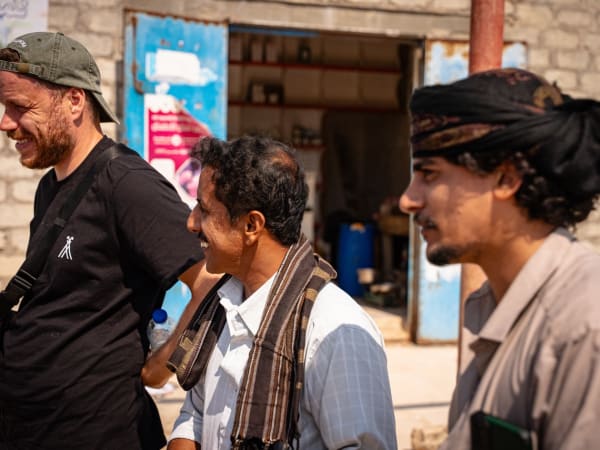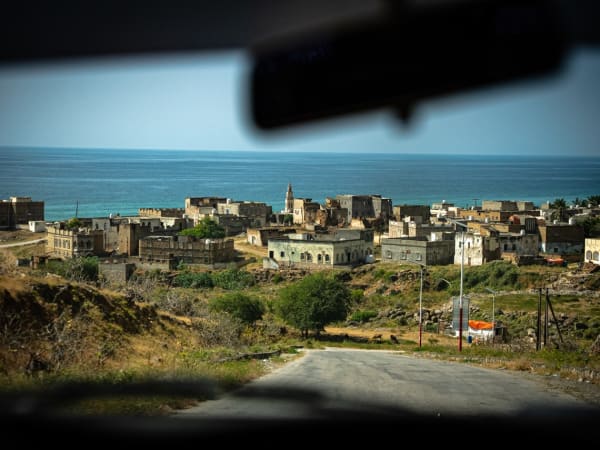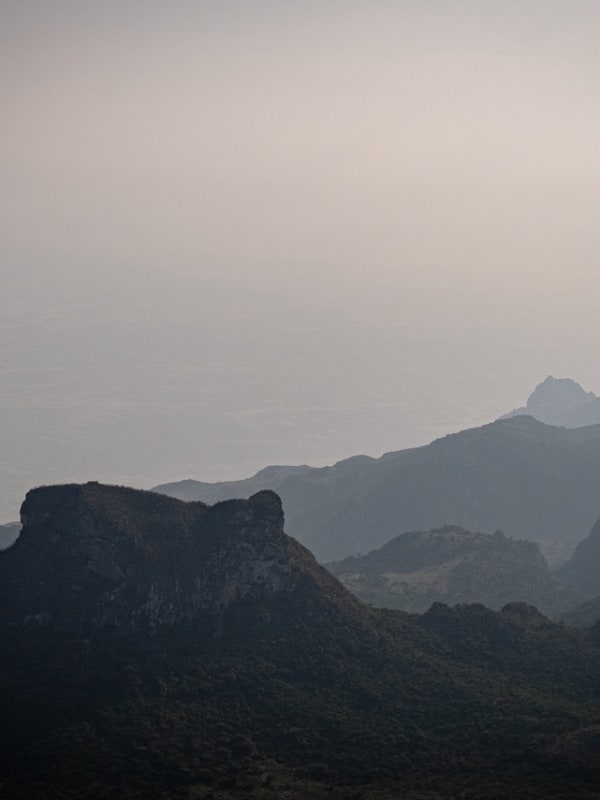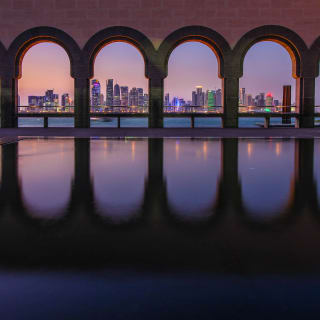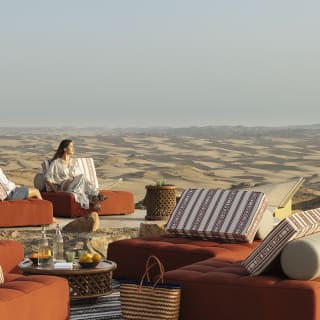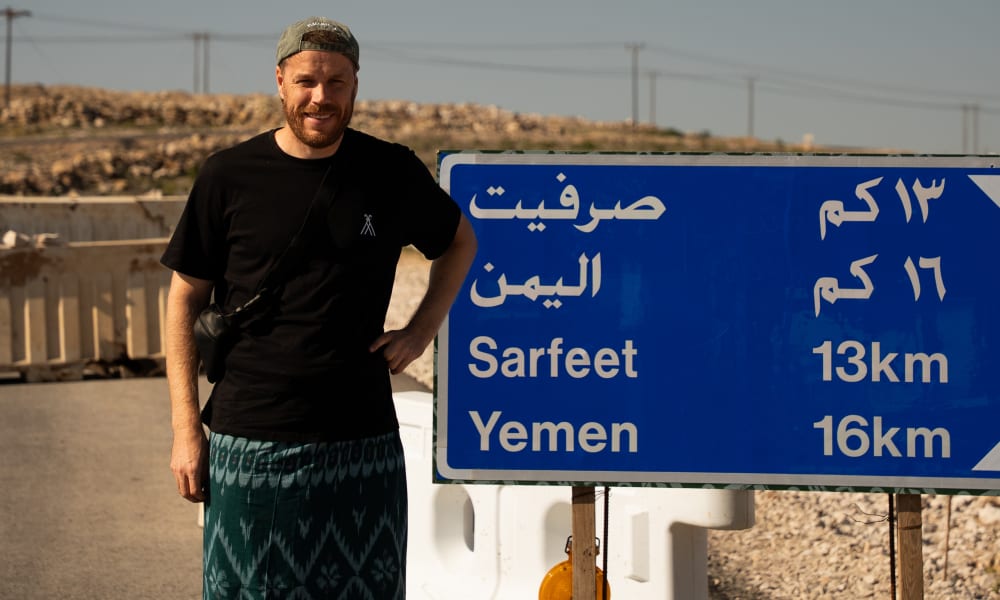
Lobster eating in Yemen
Dive in with us to Philip's personal impressions
Dive in with us to Philip's personal impressions
The west of Salalah towards Yemen has always been the most beautiful region of Oman for me. And I always wanted to drive just that little bit further – just like I've walked one more dune in the desert to see what lies behind it.
Even the border crossings give a hint of what awaits behind the curtain that I've wanted to draw back for so long: a journey through time.
Behind the modern border of Oman, the paved roads end abruptly – and just a few hundred meters further stands a small, makeshift hut, above which a Yemeni flag flutters in the wind.
"Welcome, welcome!" we are greeted. Everyone laughs, everyone is warm and curious. It has been a long time since anyone has seen a tourist here.
On the other side waits Osman, the deputy tourism minister, who beams with joy and hugs me as if we haven't seen each other in years – even though it's the first time.
I get goosebumps. Not two minutes pass, and I understand why everyone says: In Yemen, the heart of Arab hospitality beats.
The encounter with Osman would have been enough for me to return satisfied – but now I wanted to experience everything. I have missed this excitement, this thrill so much. Oman is my second home, and I try to 'recalibrate' myself to all those beautiful days in deserts and mountains again and again – just like the nose at coffee beans in a perfume shop – so that the beautiful does not become 'normal'.
Today the thrill feels different. Like a first date, after countless messages, nights full of daydreams and yearnings – finally, the fantasy becomes reality.
Suddenly, the rather romantic idea for the day takes a slight turn when our companion and helper for the day, who reminds me of Johnny Depp, gets out of the car with an AK machine gun. What seems strange at first, surprisingly fits naturally into the picture over time.
"Weapons are part of everyday life. Here in the east, we usually don’t have to use them, but we need them to show that we can defend the only things we have: our family and our animals."
We drive through the fishing village of Hawf. I am completely overwhelmed – in the best way. Everything is exciting, something stands out everywhere:
The old construction style of the huts. The cars without license plates. Even the gas station fascinates me. A man crosses the street with a freshly caught fish in hand. Two young women, whose gaze pierces me through the car window – they are asking for money.
On the right, the green mountains, on the left, the coastal road with small fishing boats – it is beautiful here. A UAE flag with a smiling emoji and a Yemeni flag with a crying emoji spray-painted on a dilapidated building. And there's a lamb on our pickup, why is that? Better not to ask.
I eventually ask why it is there.
"Better don’t get too attached to our friend – he is our lunch for today."
Everything is run-down yet exudes an absurd charm, a beauty and aesthetics that are hard to put into words. I want to photograph everything and frame each individual picture at home.
We stop by the sea on a small rock outcrop. Euphoric and emotionally overwhelmed, I mistake two boys in the water for dolphins – and everyone laughs when I blurt out a "wow, dolphins!" We call one of the young men up from the water, who dives for lobsters without equipment in rough seas. He sells us five – for the equivalent of about four euros.
"I want 80 cents for each lobster, but if you can only give 50 cents, that's okay with me too."
Yemen was once rich, the center of the frankincense trade.
Since colonial times, the country has been divided and controlled by others.
Yemen belongs to everyone – just not to the Yemenis. In many parts of the country, war reigns. Hundreds of thousands of people have lost their lives in the past ten years – among them countless children.
"Honestly, I don’t even know what anyone wants in our country. Saudi Arabia, UAE, USA… I haven’t seen anyone from there. I don’t know the Houthis in the north either. In my everyday life, there’s no place for any of this."
The people here are poor – very poor. Since wars and travel warnings, there is no work, no functioning government, and even here in the safe, quiet east, tourism has come to a standstill – and with it, every source of income.
"The people here are forgotten. The last time humanitarian aid arrived was in 2012. The average income is between 25 and 250 euros a month. Salaries often arrive late or not at all. I can’t even afford a sack of rice by the end of the month. You are the first tourists I get to welcome here. It’s nice that you are here."
The journey continues to Osman’s farm in the mountains. The animals have free run, water, and feed – that’s the only value the land currently has for him. What looks like a pool is a trough for the camels. One of them is rolling around happily in the mud and lying on its back – I've seen many camels, but never that. It feels extremely comfortable, just like my dog when he rolls in the grass, I think.
We slowly make our way up the bumpy path at a snail's pace. That our tires are still holding out is almost a miracle.
Arriving at the top, I can't get enough of the view over the coast. I have the feeling that I’m doing something that will stay for
me – not just another travel product that I develop for others.A bit overzealous, I want to try Khat – these green leaves that you chew here like others drink their coffee. After all, we have it in the cooler all day, and I want to know how it works. Here they say Khat acts like many need it: It numbs.
"But better not before meals," Osman says.
Because it has another, quite welcome effect here: It takes away your hunger.
"About 90% of the population chews Khat. That’s the only way most can function and endure their lives – they think. Of course, everyone is dependent."
For lunch, the best pieces of lamb are prepared and served to us with patience –
only after we nod in satisfaction do the hosts sit down with us.
"Even our father always divided everything into three portions – even if it was just a small amount. One for us, one for our extended family, and one was kept until evening for possible guests. Our father usually wasn’t hungry himself."
We dip the meat in honey from the mountains. When Osman notices how much we enjoy it, he gives us a full bottle – it’s his last one. He gave the others to the border officials who wanted 'something on top'.
His voice only became serious once that day – when we initially wanted to politely decline the gift.
"I’m one of only seven people who are still tied to a rope, harvesting honey along the steep cliffs. Often I get completely stung, and it’s very dangerous. But I can earn something extra this way. I love climbing and feel free while doing it."
The lamb is probably the tastiest, and certainly the only one I’ve personally met before.
Afterward, we drink tea, and during this little break, Osman shows me his rifle. He offers me to shoot into the air. I hesitate, I have respect – he notices it immediately and takes it back from me without a word.
Shortly after, we are called back: The lobster is ready.
We are the first DMC in Oman offering day trips to Yemen from Salalah. We explore the city of Hawf near the border with Oman. The trips and special visas are organized together with the Ministry of Tourism Yemen and accompanied by our Director of Experiences Abdullah Musheiqi, who comes from the region, as well as our Yemeni guide and deputy tourism minister Osman.
For us, a travel warning means: "It’s better not to go there."
For the people in Yemen, it means:
"No one is coming."
They fall out of view. Everyone talks about them, and hardly anyone speaks with them.
The people live in the now when the future offers little perspective. This presence has completely captivated me. Every conversation was genuine and intense.
With every encounter, the sun rose in my heart, and if our visits contribute to having a positive effect on the region and people, then that’s a very beautiful thought for me.
I will never forget this day in Yemen and will return as soon as I can.
Lobster eating in Yemen | Blog article - Orient Memories
Discover the Orient with experts who have explored every corner themselves
Your dream holiday, tailor-made by experts.
We don't just know the Middle East from books, we visit the country several times a year to experience the culture, landscape and people first-hand.
From your first enquiry to your return home, we are there for you personally - by phone, email or WhatsApp, whenever you need us. Our trips are as unique as you are: individually planned and provided with exclusive privileges and high-quality arrangements that will make your trip unforgettable.
Experts for your Orient trip


